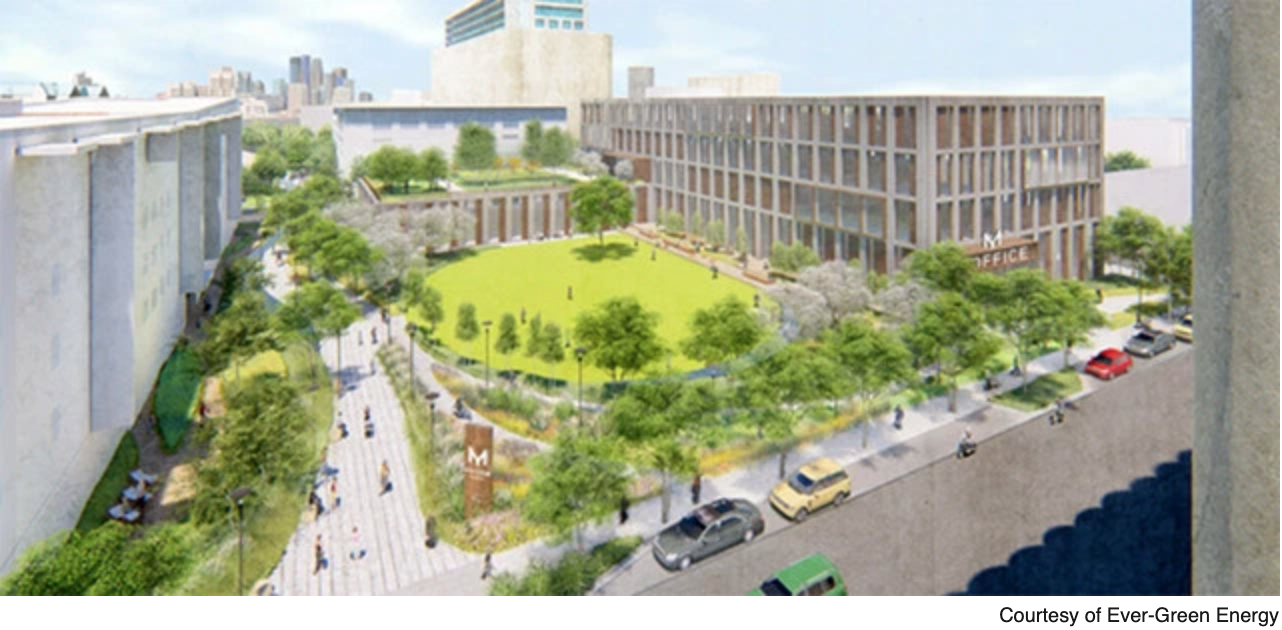
This article is from Midwest Energy News, part of the Energy News Network, a nonprofit news site dedicated to keeping influencers, policymakers and citizens informed of the important changes taking place in the transition to a clean energy system.
View Article
A Minneapolis developer wants to tap into aquifers to heat and cool a planned food hall and apartment complex on the city’s eastern edge.
If successful, the project could offer a model as Minneapolis looks to reduce its reliance on natural gas — the dominant source of heating in the notoriously cold city and also its largest source of carbon emissions.
Wall Companies is working with Ever-Green Energy and Underground Energy on an aquifer thermal system for its 17-acre Malcolm Yards project, part of the emerging Towerside Innovation District near the University of Minnesota.
Aquifer thermal energy uses a system of wells and heat exchangers to store and recover thermal energy underground. In the summer, heat is extracted from buildings and transferred to an aquifer. In the winter, the system is reversed, with warm water pulled up and circulated to heat buildings.
The concept is common in Denmark and other parts of Europe but relatively unknown in the United States, with few projects in operation and none on the scale being considered for the Minneapolis project.
Ever-Green Energy, which also manages St. Paul’s District Energy heating and cooling network, has advised several geothermal exchange proposals around the country, including San Francisco’s Mission Rock development, which would use bay water to heat and cool 2.7 million square feet of apartments, offices and commercial space.
As more cities look to move beyond natural gas, heating remains a challenge in colder climates. Electric heat is often an expensive option and requires a substantial load for multifamily buildings. Geothermal systems — with enough partners — can make more financial sense, especially for new developments.
“That’s what’s great about these projects that are starting from scratch,” said Nina Axelson, Ever-Green’s vice president for sustainability and outreach. “The energy infrastructure can be built first, and then the buildings added. It’s easier than trying to retrofit several existing buildings or a campus.”
As more buildings are attached to the system, the cost significantly drops. At least three other developers in the Towerside district have expressed interest in tapping into aquifer thermal for heating and cooling. Wall Companies is also considering making participation a requirement for buyers.
“It has taken a lot of work, but we believe it’s the right thing to do and that this is the right opportunity,” said Jeff Ellerd, project manager for Wall Companies. “It’s time for a nontraditional heating and cooling source that can serve our development and others.”
Minneapolis has a goal of reducing carbon emissions by 80% by 2050, a hard slog when few heating sources exist as inexpensive as natural gas. The Towerside project could offer a blueprint for several other large redevelopment plans underway where geothermal exchange district energy could work.
“We have to do something about decarbonizing heating and more electrification of building heating,” said Robin Garwood, an aide to City Councilor Cam Gordon, who represents the neighborhood. “This system is one of the best examples I’ve seen using currently available technology to move toward full decarbonization and electrification.”
The Towerside district planners initially explored an idea to harvest heat from sanitary sewers but could not get approval from the Metropolitan Council, which manages the region’s wastewater systems. With sewer heat hitting a dead end, Ever-Green proposed aquifer thermal energy storage for Towerside.
In the beginning, the aquifer thermal system will be more expensive than running natural gas to each unit. The developer might be able to charge above-market rates for apartments by promoting them as carbon neutral. Property assessed clean energy financing, or PACE, could provide additional support, Ellerd said.
Wall Companies is also seeking support from the city. It expects to bring a budget and plan to the City Council within the next two months. The City Council would have to agree to allow the sale of bonds to back up the investment. The city’s bond fund has a long track record of successful investments, including the renovation of stages in the city’s theater district.
Without financial backing from the city, the aquifier thermal energy system will not go forward. Few developers could invest in such an ambitious and relatively untried approach. “The city needs to be a player because we can’t scale it,” Ellerd said. “I think that if it doesn’t happen here, it won’t happen anywhere.”
- By Frank Jossi, Midwest Energy News | 01/31/2020

